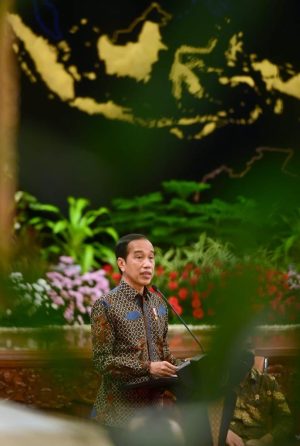In 2024, Indonesians will go to the polls to choose Joko Widodo’s successor as president. Despite the election being two-and-a-half years away, the political heat between political parties is already surging and arguably will continue to escalate over the next year.
A recent survey conducted by Arus Survei Indonesia showed that only seven of the country’s 16 largest parties were likely to pass the 4 percent threshold necessary to gain seats in parliament. The Indonesian Democratic Party of Struggle (PDIP) was the most popular party with those surveyed, with 19.6 percent pledging their support, followed by the Great Indonesia Movement Party (Gerindra) with 14.9 percent, the Party of Functional Groups (Golkar) with 10.4 percent, the National Awakening Party (PKB) with 9.7 percent, the Democratic Party with 7.9 percent, the National Democratic Party (Nasdem) with 6.7 percent, and the Prosperous Justice Party (PKS) with 5.2 percent.
This indicates little significant change from the 2019 presidential election, when PDIP, Gerindra, and Golkar dominated the voters’ support. Nevertheless, the presidential race is quite different from the parliamentary election, and the candidate’s profile often plays a major role in voters’ decision. Therefore, even if a party wins a majority in parliament, it does not guarantee that its presidential candidate will get similar support, as in 2004, when Golkar won the parliamentary election, but failed to get its presidential candidate elected.
Theoretically, the incumbent PDIP is in the box seat to win the upcoming parliamentary election as well as to push its presidential candidate in 2024, given that it enjoys the benefits of incumbency and will be able to draw on the achievements of Jokowi’s administration. In 2014, Megawati Sukarnoputri, as head of the PDIP, decided to be a king maker for Jokowi instead of pushing herself or her daughter Puan Maharani as the party’s presidential candidate, a decision that was justified by the Jokowi’s resounding victory.
Puan Maharani’s low levels of popularity influenced the party’s decision to put Jokowi forward in 2014, and it is unlikely that she will be a viable candidate in 2024. Despite her tenure as Coordinating Minister for Human Development and Cultural Affairs (2014-2019) and her current position as speaker of the People’s Representative Council, her electability currently languishes at just 1.4 percent. Therefore, the PDIP has to choose other alternatives if it wants to win the election.
This has put Ganjar Pranowo, the governor of Central Java, in a good position to win the PDIP’s nomination. The latest survey conducted by Polmatrix Indonesia shows that Ganjar is the second most popular presidential candidate after Defense Minister Prabowo Subianto, who ran against Jokowi in both the 2014 and 2019 presidential elections. This suggests that there is a big opportunity for Prabowo to join the presidential race in 2024. As the head and the founder of Gerindra party, Prabowo will face few meaningful obstacles to once again competing in the upcoming elections.
Meanwhile Golkar, as the party with the third-highest electability, is faced with the fact that its head Airlangga Hartanto is the choice of just 1.1 percent of voters, according to the recent survey by Polmatrix Indonesia. The third strongest presidential candidate after Ganjar and Prabowo is Anies Baswedan, the current governor of Jakarta. In the previous Jakarta gubernatorial election, Anies obtained major support from the right-wing Islamist groups. Therefore, there is a big potential for the Islamist vote to swing to support Anies in a possible presidential run.
Even though Anies has strong electability, he needs support from the Gerindra party if he is to prevail. If Prabowo decides to join the 2024 presidential race, then Anies needs support from several other parties. Hypothetically, based on recent survey results, if Islamic parties including PKB and PKS support him, he will obtain 14.9 percent of the popular vote. This might offer a chance for Anies, but at the same time, it could cost him the support of moderate Islamic groups and voters. Therefore, he needs to build a coalition with the more moderate Democratic and Nasdem parties. The main question is whether each of these parties would support Anies as their presidential candidate.
Based on the political dynamics described above, it is quite difficult to forecast who will succeed Jokowi. Ganjar’s fate depends on Megawati’s next move. If she decides to be king maker for Ganjar, then there is a big possibility that Ganjar will prevail. But then she would need to sacrifice the chance for her daughter to run for the presidency. The alternative is if the PDIP decides to build a coalition with Gerindra, by backing Prabowo as president and Puan Maharani as his vice presidential running mate, which would give the latter an opportunity to attain high office. But again, this depends on PDIP’s willingness to sacrifice its own interests as the party with the highest electability ratings and the largest number of seats in the parliament. This would be a tough decision for PDIP to make.
Meanwhile, Prabowo needs support from Jokowi’s moderate nationalist support base if he is to win the upcoming election. Without that support, the political polarization between the moderates and right-wing Islamists will continue. This certainly will ruin Jokowi’s effort to unite them.
The identity of Jokowi’s next successor will therefore hinge on the PDIP’s next moves, and how this bears on other leading parties’ presidential candidates.

































